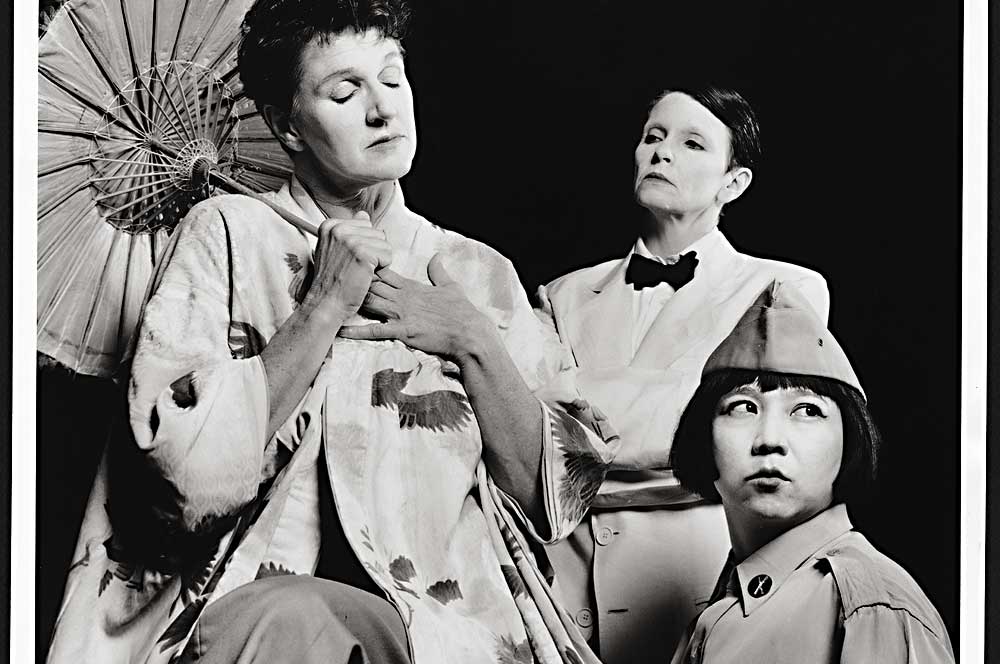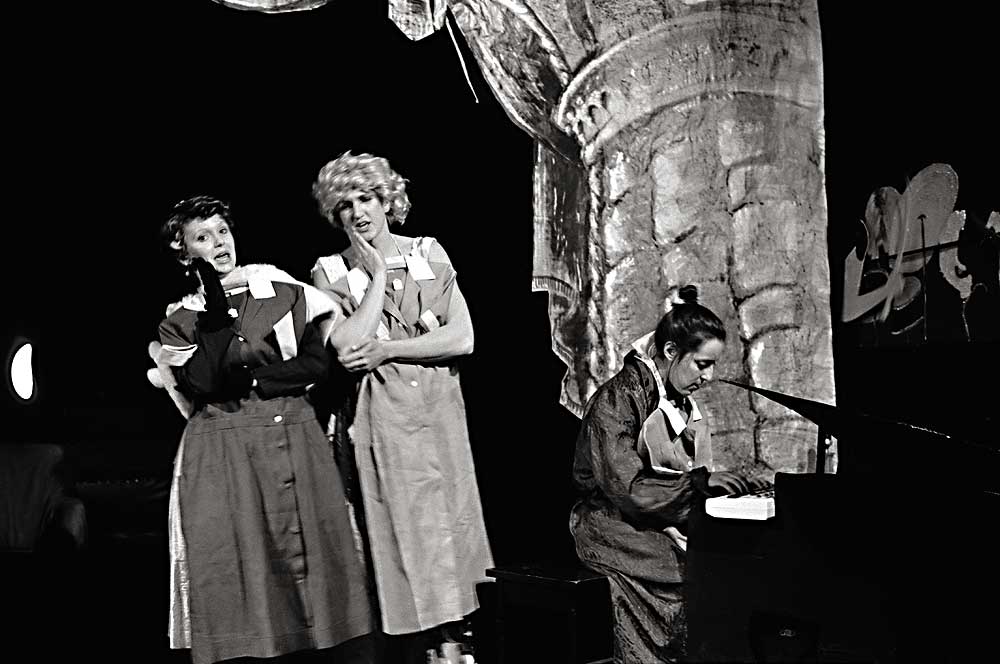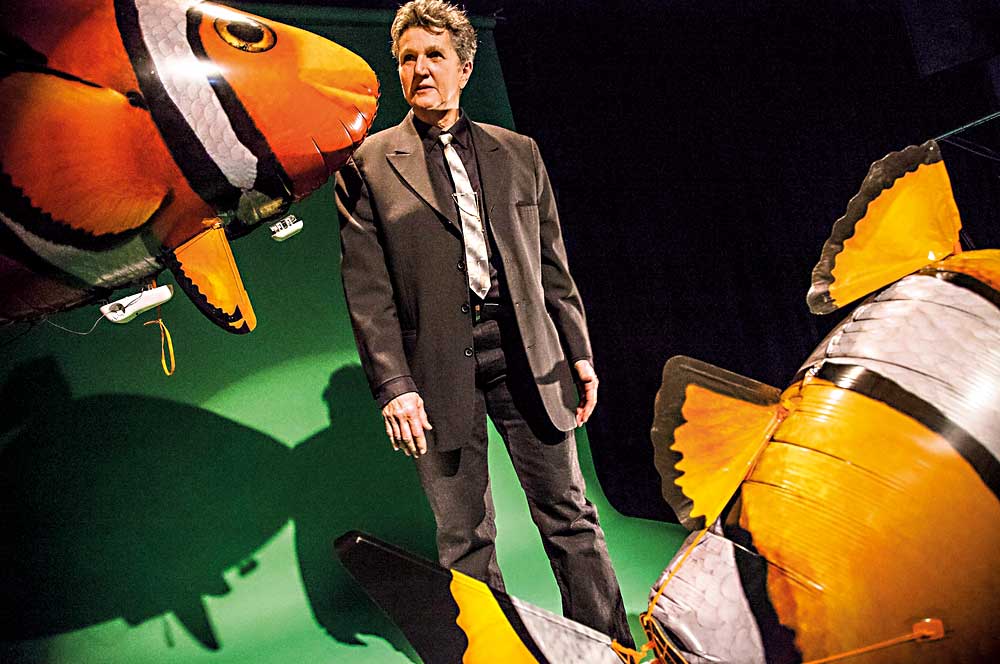The conference room was packed to overflowing. A large table in the center of the room was covered in white paper, inviting people to scribble on it. Near the head of the table, side by side, sat Peggy Shaw and Lois Weaver, two women who have been moving forces in avant-garde theatre in New York City and beyond for roughly four decades.
The evening—organized this past July by the Hemispheric Institute of Performance and Politics, where Shaw and Weaver were artists in residence in 2010 and which houses an online library of videos that includes many of their performances—was devoted to methods of archiving live performance. The discussion took the form of a Long Table, a format for generating dialogues on challenging subjects that Weaver developed in 2003.
Why, someone asked the pair at one point, all the recent buzz about the importance of archives? Shaw’s response, delivered in her singular Boston-meets-New York accent, cut across the crowded room: “I am an archive.”
Indeed, both Shaw, 69, and Weaver, 64, are living archives. Since meeting in the 1970s, they have been artistic collaborators (for a time, they were also lovers), and have gone on to serve as teachers and mentors to younger colleagues. The record of their evolving and unconventional professional and personal partnership is inscribed in much of their work.
Each has worked in a variety of ways to create visibility and space for women performers, particularly those who self-identify as lesbian or queer. WOW Café Theatre, the collectively run downtown space Shaw and Weaver helped found in the early 1980s, has provided a home base for innovative artists such as Holly Hughes, Carmelita Tropicana, Lisa Kron, and Moe Angelos to hone their craft. But above all, it’s the daring, endearing, smart and frequently groundbreaking performance work that Shaw and Weaver continue to produce, mainly under the company label Split Britches, that has influenced a generation of writers and performers.

Peggy Shaw began her life “by accident,” she recalled, in the early 1970s. After finishing a fine arts degree in Boston in 1967, she moved to New York City, where early on she was impressed by downtown impresario Charles Ludlam’s play Bluebeard, mounted by his Ridiculous Theatrical Company. Soon after, she ran across a roving performance by the drag troupe Hot Peaches in the West Village. These works, fervent in their embrace of gay subjects, ignited Shaw’s sense of possibility: She asked Hot Peaches point blank if she could follow the group around—and that’s how she began painting sets and building props for the company.
In 1975, Hot Peaches took its work to London, and Shaw, along with her young daughter, joined the group on the trip. “We don’t have any lesbian material, so go write it,” Shaw remembers Hot Peaches artistic director Jimmy Camicia telling her—an exhortation that helped prod Shaw into a career as a writer and performer. She was petrified getting up onstage for the first time, but those fears didn’t last long. She began performing regularly with Hot Peaches.
A couple years into her rambunctious U.K. period, Shaw took a trip to Amsterdam, where she first met Weaver, who was appearing at the time with the multiethnic troupe Spiderwoman.
Weaver’s own path to that serendipitous meeting in Amsterdam was a bit more direct. “I got involved in the theatre when I was four years old and my parents stood me on the table and made me sing ‘(How Much Is) That Doggie in the Window?’” Weaver deadpans—and from then on, she knew she wanted to be onstage. She studied theatre and experimental performance at Radford University in Virginia and, following school, went to work with the Baltimore Free Theater before joining Spiderwoman.
Not long after their meeting in Amsterdam, Shaw was asked to join Spiderwoman on its European tour. It was during those travels to countless women’s festivals across the continent that Shaw and Weaver got the idea to create their own women-focused festival back in New York.
Carrying with them a web of international connections, they returned to New York City and, along with Pamela Camhe and Jordy Mark, began work. In October 1980, after months of grassroots fundraising, planning and organizing, the Women’s One World (WOW) Festival was launched, with 36 shows from 8 countries. One entry on the program was Shaw and Weaver’s own piece Split Britches, created and performed with Naja Beye and Pam Verge.
Holly Hughes, who with fellow WOW alum Carmelita Tropicana is editing an anthology of early texts from WOW, emphasizes the lasting resonance of that early play. “Over and over again people talk about Split Britches as a paradigm shift. They were able to meld a broad and, I would say, intersectional politic, with a really sophisticated and unique aesthetic vision. It felt like such a revelation.”
Inspired by Weaver’s family history, Split Britches gets its name from the pants sometimes worn by rural women working in the fields so they could relieve themselves without leaving their work. The play was performed again at the second WOW Festival in 1981, and this time Shaw and Weaver were joined by Deb Margolin. That trio—Shaw, who defined herself as a butch lesbian from working-class Boston; Weaver, a femme lesbian with roots in the Blue Ridge Mountains of Virginia; and Margolin, a straight Jewish woman from New York—joined forces to form the core of a company named after the play.
“I consider it a radical theatre company,” Margolin said in a phone interview. “The small contribution it has made toward giving permission to women authors, who had not been credited with having any value, was incredibly important.” Shaw and Weaver assert that theatrical rather than political concerns have always been foremost in their creative work, but numerous scholars and commentators have noted that simply placing themselves onstage in whatever guise or narrative they preferred, irrespective of societal norms, was itself a radical act. Margolin left the company to pursue her own work in the early 1990s, but Shaw and Weaver continue to create work under the Split Britches umbrella.
Shaw and Weaver’s aesthetic combines playful theatrics with a deep questioning of what it means to be lesbian, to be a woman, to be a complex and feeling human being trying to live fully in the world. Their performances incorporate autobiography, borrowed narratives, elements of the ridiculous, dashes of vaudeville, singing and lip-synching, postmodern structures, all delivered with a quintessentially do-it-yourself flavor. The shows are enormously fun, even when they evoke sadness and introspection.
Dress Suits to Hire, created with Hughes in 1987 and revived in 2003, and Belle Reprieve, a 1990 collaboration with the British drag group BlooLips, both of which garnered Obie awards, make use of archetypal American narratives. In the noir-laced send-up of romantic plots and pulp that is Dress Suits to Hire, romantic desires end up being thwarted by the pursuer rather than the pursued. In Belle Reprieve, gender roles are reversed or destabilized when a single character inhabits both the feminine and the masculine, as in Shaw’s reinterpretation of Stanley Kowalski in this parody of A Streetcar Named Desire.
The collaborators have carried their multivalent aesthetic forward into the solo work that each began developing in the mid-’90s. Weaver has, for the past decade, created work around the fictional character Tammy WhyNot. Much as the early play Split Britches poked fun while asking bigger questions about feminism and female identities, Weaver uses Tammy to rib performance art and feminist scholarship, while investigating subjects like aging, celebrity and the nature of femininity.
Shaw’s Obie-winning 1997 show Menopausal Gentleman, part of a Lambda Literary Award–winning collection of her solo work edited by scholar Jill Dolan, focuses more directly on personal subject matter. In it, Shaw explores being a woman, being perceived as a man, her changing body and her shifting primal desires. The piece was praised as a crucial and moving depiction of one woman’s experience of growing older in the distinctive context of her butch identity and other’s perceptions of her.

Shaw’s latest solo performance RUFF, cowritten and directed by Weaver, runs at downtown Manhattan’s La MaMa ETC Jan. 6–26. The piece, primarily an examination of Shaw’s experience of having a stroke in 2011, juxtaposes a quick lesson on how to detect stroke symptoms with Shaw’s classic crooning to musical standards, and extends to explorations of loss, memory and possibility.
Perhaps what’s most remarkable about the show is the daring choice to make visible one of Shaw’s post-stroke struggles as a performer—remembering her lines. The performance space is dotted with flat-screen televisions that scroll through the play’s script for the duration. The screens are not offstage or out of view, but visible in front of both her and the audience.
That choice ultimately builds on a critical element that runs through all Split Britches’ work. Weaver describes it this way: “The idea of leaving a mistake or a flaw in the work came from my experience with Spiderwoman. The group was named after a Hopi goddess, and she taught her people to weave—but she taught them always to leave a flaw, so the spirit could come and go.”
What may seem like a clever Brechtian trick has far deeper meaning for Shaw and Weaver, as it echoes their early desire to challenge what they saw in the 1970s as a male-centric theatre focused on presenting artifice. The choice to include imperfection mirrored their artistic and political commitment to represent outsider perspectives. Theory aside, though, in Shaw and Weaver’s performances, the breaks in action work incredibly well. These moments allow the performers’ humanity to shine through in a way that is both poignant and honest. Their hard-earned chops assure you as an audience member that you are in very good hands.
In tandem with RUFF, Shaw and Weaver have put together a gallery show titled Desperate Archives, on display in the La MaMa Galleria exhibition space Jan. 3–19. More than a simple collection of photos and ephemera, this exhibit asks larger questions about loss and the desire to hold on. Shaw and Weaver describe the work as the third piece in a trilogy that started with Miss America (2008), about the breakdown of the American Dream, and Lost Lounge (2009), which examined the endless cycles of change in New York City.
Both RUFF and Desperate Archives carry Split Britches’ legacy forward into the present, providing observations on the realities of shifting relationships, changing bodies, altered values in an unsettled world—and opening yet another window into two remarkable lives.
Alexis Clements, a playwright and arts journalist based in Brooklyn, co-edited the play anthology Out of Time & Place, which includes her play Conversation.


